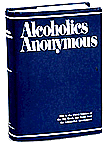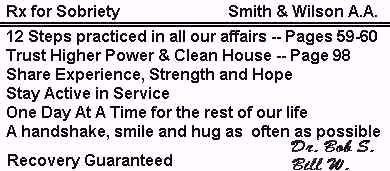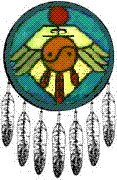

 Click The Images To Go To Page Indicated In The Flag
An article on page F1 by David Mehegan, Globe Staff, 12/26/01.
"AA's growing pains evident in revision of its Big Book. Group stresses mission as reason for changing stories." Perennial bestsellers mostly are famous: the Bible, Homer's "Odyssey," "How to Win Friends and Influence People," "Anna Karenina," "The Lord of the Rings." But not all hot books are famous. Outside its circle of influence, one of the hottest books of the past 60 years is almost unknown. Its tětle is "Alcoholics Anonymous: The Story of How Many Thousands of Men and Women Have Recovered From Alcoholism." But to the millions who live by it, it's known simply as the Big Book. Written by AA cofounder William G. Wilson ("Bill W.") with help from cofounder Robert H. Smith ("Dr. Bob") and other early members, and published in 1939, the Big Book has sold more than 21 million copies. It has been translated into 43 languages. Yet you don't see it in bookstores. They can get the book, but it's usually ordered directly from AA World Services, the publisher. In 62 years, the price has risen, of course: from $3.50 to $5. Until now, the Big Book had been revised only twice: in 1955 and 1976. Now the fourth edition is just off the press, and its painstaking revision is a window into the delicacy of tinkering with a book that many people revere as inspired scripture. AA was founded in 1935. When there were about 100 members, Wilson and Smith decided they needed a text if the movement were to continue to grow. Wilson wrote most of the first 164 pages, outlining the philosophy, principles, and method, and collaborated with Smith and the other members in pulling together the rest of the book, which consists of 42 personal testimonies of recovered alcoholics. The first edition's stories were mostly by white men, coming out of the world of the teens, 1920s, and Great Depression. But since AA was open to all, other kinds of people began to join: more women, Indians, African-Americans. So in 1955 Wilson revised the book himself (Smith died in 1950), leaving the first 164 pages alone, but substituting many new stories, from a newly varied membership, for old ones. Wilson died in 1971, and several years later the book was revised a second time, by a committee. Again stories were changed, but again the first 164 pages were left alone. The new edition retains 16 stories from previous editions, including several by the pioneers, and adds 24 new ones. Once again, however, the first 164 pages were left untouched. Why not revise those pages? As explained by Richard, of Chicago, a trained historian who chaired the revision committee, "In the culture of AA, you don't mess with the words of the founding members. We had to be clear that the part written for all time was not what we were working on." The importance of the Big Book to most committed AA members can hardly be overstated. (It is also used by many other addiction-fighting groups, such as Overeaters Anonymous.) In their various ways, they trust it and they love it. "When they give it to you," says David, 39, of Boston, "they say, 'It's terribly written, and it will save your life.' When you read the first 164 pages, it is unvarnished mid-century prose: clunky, awkward, and quite wonderful, full of phrases you can't imagine anyone writing anytime after World War I, let alone 1939. But underneath the odd wording and clunkiness is this basic message of hope." "It really did save my life," says Margaret, 43, of Brookline. "How did they ever put these words together to make it so powerful? None of the stories put me off. I didn't think it was hokey. I soaked it up and identified with every sentence. It grips you if you are an alcoholic." While there may be unanimity on the first 164 pages, there is none about the stories. "When I first got it," says Dave, 26, of Somerville, "I read the stories. Now I don't look at the stories. When I'm in a bad space, I have a harder time relating to them." But others have a deep commitment to certain ones. Michael, of Brookline, was crestfallen when it appeared that a classic story, "Doctor, Alcoholic, Addict," had been excluded from the new edition. "There are two paragraphs about acceptance, on Page 449," he said sadly, "that I read every morning." He was relieved to discover that it was only renamed, "Acceptance Was the Answer," and moved (449 is now 417). His bond with that one page is not uncommon. AA members tend to know what is meant by a reference to "Page 449" or "Page 83." Revising the Big Book was therefore a dicey affair, though Richard says it helped that the first 164 pages were strictly off limits, however dated their tone, slang, and social assumptions. "AA is of necessity historic," he says. "Without that, there is a risk of amnesia about what went on before, of devaluing this sense of experience." Leaving the first part untouched means that every new member in a sense meets Bill W. and Dr. Bob personally. But in the committee, there was no consensus on the stories, which constitute 80 percent of the book. So the committee decided to research Wilson's writings to find out his attitude toward the book - much as constitutional scholars dig into what James Madison or John Adams meant by "high crimes and misdemeanors." They found, says Richard, that "Bill always saw the book as organic and dynamic, never locked in. The book was not for those of us who were already here. That was cold water for many. People who had been in AA for 30 years said, 'But you can't take out that story - it's my favorite.' But we had to say, 'We don't care. You're sober now. We need to change it for the new people.'" Even so, most of the oldest stories in Part One, "Pioneers of AA," were kept, including "Dr. Bob's Nightmare" and "The Keys to the Kingdom," by a former flapper of the Roaring Twenties. The new revisers decided to invite the fellowship (1.4 million members in the United States and Canada) to submit stories. More than 1,200 stories came in, and over a year's time they were winnowed to 24. One criterion for the new selections was greater diversity, although Richard said the AA way of saying that was "a broad cross-section of sharing." He says, "AA today is younger, more female, more brown and black, more gay." The new storytellers include several American Indians (although an older Indian story, "Join the Tribe!," written in painfully stereotypical dialect, was dropped), Jews, African-Americans (including a pioneer), a gay man and a lesbian, and several young people. Some AA members have an exaggerated reverence for the book, including those known as "Big Book Thumpers," who believe that in it are the solutions to all life's problems. Some call it AA's Bible, which Richard, speaking only for himself, resists. "Some members see it as divinely inspired," he says. "They believe that Bill was given this book not through his intellectual discovery, but as a delivered text. Some have come close to putting Bill and Dr. Bob on a pedestal: Whatever they said is the literal truth. The book is an esthetic and a guide. Those who want to turn it into a literal manual of life move it in a direction distant from life." About a million copies of the Big Book are distributed each year in English alone, and the growth of Alcoholics Anonymous is accelerating worldwide. "AA is meant to be for humankind, not bounded by people in New York or Akron," Richard says. "In the last 20 years it has spread quickly in cultures very different from our own. In India, AA is poised to become a huge phenomenon. In the next few years, the majority of AAs may be Asian." In that event, the fourth edition of the Big Book may have a much shorter life than its predecessors. The Big Book and other AA publications can be ordered from AA World Services Inc., PO Box 569, Grand Central Station, New York NY 10163, or from www.aa.org David Mehegan can be reached by e-mail at mehegan@globe.com.
 Just thought you would like to know. Love and Peace, Barefoot Index of AA History Pages on Barefoot's World As in so many things, especially with we alcoholics, our History is our Greatest Asset!.. We each arrived at the doors of AA with an intensive and lengthy "History of Things That Do Not Work" .. Today, In AA and In Recovery, Our History has added an intensive and lengthy "History of Things That DO Work!!" and We will not regret the past nor wish to shut the door on it!! ABC Page 60 -- Barefoot's Recovery Pages
KEEP COMING BACK!
On the Web Jan 8, 2002 in the Spirit of Cooperation Three mighty important things, Pardn'r, LOVE And PEACE and SOBRIETY |


